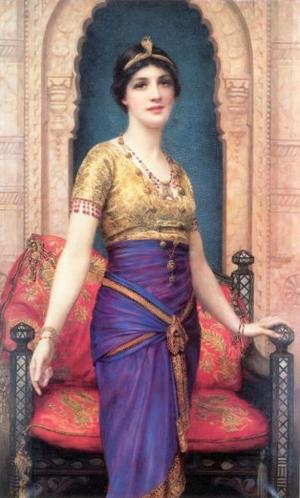| Author: | Robert E. Howard | ISBN: | 9781465546296 |
| Publisher: | Library of Alexandria | Publication: | March 8, 2015 |
| Imprint: | Language: | English |
| Author: | Robert E. Howard |
| ISBN: | 9781465546296 |
| Publisher: | Library of Alexandria |
| Publication: | March 8, 2015 |
| Imprint: | |
| Language: | English |
The fisherman loosened his knife in its scabbard. The gesture was instinctive, for what he feared was nothing a knife could slay, not even the saw-edged crescent blade of the Yuetshi that could disembowel a man with an upward stroke. Neither man nor beast threatened him in the solitude which brooded over the castellated isle of Xapur. He had climbed the cliffs, passed through the jungle that bordered them, and now stood surrounded by evidences of a vanished state. Broken columns glimmered among the trees, the straggling lines of crumbling walls meandered off into the shadows, and under his feet were broad paves, cracked and bowed by roots growing beneath. The fisherman was typical of his race, that strange people whose origin is lost in the gray dawn of the past, and who have dwelt in their rude fishing huts along the southern shore of the Sea of Vilayet since time immemorial. He was broadly built, with long, apish arms and a mighty chest, but with lean loins and thin, bandy legs. His face was broad, his forehead low and retreating, his hair thick and tangled. A belt for a knife and a rag for a loin cloth were all he wore in the way of clothing. That he was where he was proved that he was less dully incurious than most of his people. Men seldom visited Xapur. It was uninhabited, all but forgotten, merely one among the myriad isles which dotted the great inland sea. Men called it Xapur, the Fortified, because of its ruins, remnants of some prehistoric kingdom, lost and forgotten before the conquering Hyborians had ridden southward. None knew who reared those stones, though dim legends lingered amond the Yuetshi which half intelligibly suggested a connection of immeasurable antiquity between the fishers and the unknown island kingdom
The fisherman loosened his knife in its scabbard. The gesture was instinctive, for what he feared was nothing a knife could slay, not even the saw-edged crescent blade of the Yuetshi that could disembowel a man with an upward stroke. Neither man nor beast threatened him in the solitude which brooded over the castellated isle of Xapur. He had climbed the cliffs, passed through the jungle that bordered them, and now stood surrounded by evidences of a vanished state. Broken columns glimmered among the trees, the straggling lines of crumbling walls meandered off into the shadows, and under his feet were broad paves, cracked and bowed by roots growing beneath. The fisherman was typical of his race, that strange people whose origin is lost in the gray dawn of the past, and who have dwelt in their rude fishing huts along the southern shore of the Sea of Vilayet since time immemorial. He was broadly built, with long, apish arms and a mighty chest, but with lean loins and thin, bandy legs. His face was broad, his forehead low and retreating, his hair thick and tangled. A belt for a knife and a rag for a loin cloth were all he wore in the way of clothing. That he was where he was proved that he was less dully incurious than most of his people. Men seldom visited Xapur. It was uninhabited, all but forgotten, merely one among the myriad isles which dotted the great inland sea. Men called it Xapur, the Fortified, because of its ruins, remnants of some prehistoric kingdom, lost and forgotten before the conquering Hyborians had ridden southward. None knew who reared those stones, though dim legends lingered amond the Yuetshi which half intelligibly suggested a connection of immeasurable antiquity between the fishers and the unknown island kingdom















